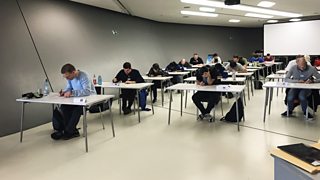How to be a supercalculator
Supercalculators are the fastest human number-crunchers on the planet – able to add, subtract, multiply, divide, or factorise large numbers with no need to reach for a smart phone, computer or calculator. So how do they do it, and is it a skill that any of us can learn? Alex Bellos gets the lowdown from the experts, and discovers the secret of champions...
1. Know your times-tables
With Rachel Riley, resident arithmetician on the Countdown quiz show

Rachel: The problem with working on Countdown is that I can't go into a hotel without trying to find the prime factorisation of the room numbers. When you look at a number, it's about the clues the number gives you about its identity, the ending, or just the look of it. So, with three-digit numbers, I can't avoid it: I'll just factorise it – I can't apologise for this, or change it.
Alex: OK, here's a number: 781. What are the factors of that?
Rachel (immediately): 781, the prime factorisation is 11 times 71.
Alex: Have you got that memorised?
Rachel: No. The middle number, 8, is 7 plus 1, the two outside numbers added together; 781 divides by 11 so it's easy to say it's times 71. Anyone who knows their times-tables up to times-12 will know that 11 and 71 are prime*.
*A prime number is a natural number greater than 1 that cannot be formed by multiplying two smaller natural numbers, eg 2, 3, 5, 7, 11, 13, 17, 19, 23 and 29.
2. Combine the best methods of calculating
With Mohammad el Mir, from Lebanon
Alex: I hear your speciality is square roots and cube roots?
Mohammad*: I am good in square roots and exact and inexact cube roots. In my head, I use a mix of European methods and the Japanese abacus, the soroban.
*Mohammad won the Junior Mental Calculation World Championship in 2014, when he was 11. He has now started competing against adults in the Mental Calculation World Cup (MCWC).

3. You have to practise every day
With TrendZ Abacus Mental Maths Team, Rajasthan, India

Alex: What does it take to be a good mental calculator?
Head Coach: Consistent daily practice, 365 days a year, even if it's only for 10 minutes. We follow the Japanese abacus method as the foundation. It helps the speeding of basic calculation in addition, subtraction, multiplication and division. For everything else we use the 10,000-year-old Indian mathematical system called Vedic Maths*.
*Vedic Mathematics is a book written by the Indian monk Swami Bharati Krishna Tirtha and first published in 1965. It contains a list of mental calculation techniques claimed to be based on the Vedas. (Wikipedia)
4. Mind-mapping techniques can help
With Robert Fountain, UK two-time winner of the Mental Calculation World Cup
Alex: The first round of the MCWC, the Calendar round, gives competitors lists of dates such as 5 July 1821; competitors have to name the day of the week on which the dates fall – in one minute. Last time, the best candidate scored 66, more than one a second. How do you do it?
Robert*: For some people it's more memory than arithmetic. In my case it's definitely a calculation. It's based on the idea that in a non-leap year there are 365 days, that's one day left over from 52 weeks, so each year moves on a day of the week – the same day the following year will be a week later. And two days if it's a leap year, after February the 29th. So I am exploiting that principle; mapping all the dates I see back to 1900, my base year, and I allow for this correction. I know all the dates for January 1900, so I can map back all the years and all the months to January.
*Robert came 11th in the 2018 MCWC.
5. Having a good memory is important
With Brian Butterworth, Emeritus Professor of Cognitive Neuropsychology at University College, London
Having a good memory is important, but it’s not the be-all and end-all of being a supercalculator.
Alex: How much of these calculations are just memory tricks?
Brian: Having a good memory for these things is a necessary but probably not sufficient reason for being a good calculator. You also have to know a lot of procedures, again which you have to memorise, but then you have to know which procedures to use for which sort of problems, and then how to apply them and check you've got them right.
Alex: Can anyone do it, or is it something about people's brains?
Brian: Clearly it's necessary to put in all the work, but whether anyone could do it by putting in the work, we don't know.
6. Picture an abacus in your head
Alex Bellos, writer and mathematician, concludes:
The overall winner of the 2018 Mental Calculation World Cup was 14-year-old soroban-trained Tomohiro Iseda, from Japan. Clearly learning with an abacus turbo-charges mental calculation skills. The abacus, or soroban, is a hand-sized gadget which represents numbers by positioning beads on rods. Once you've mastered it, it becomes so imprinted on your brain that you can calculate by moving invisible beads in your head. Since seeing is quicker than hearing, the abacus-trained calculators are able to calculate faster.
Alex Bellos presents The Supercalculators on BBC Radio 4. Listen now.

Mind games on Radio 4
-
![]()
The Supercalculators
Alex Bellos explores the amazing mathematical feats of the supercalculators.
-
![]()
Puzzles for Today
Pit your wits against the Today programme's puzzle-meisters.
-
![]()
Radio 4 Quizzes
From autumn leaves to rock-or-robin? Test yourself with our favourite quizzes.
-
![]()
The Apostrophe Quiz!
Are you grammatically gormless or a punctuation perfectionist?




